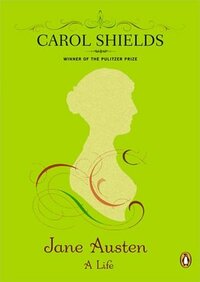Take a photo of a barcode or cover
Here’s what I liked:
• The book is short which is in keeping with the amount of information we have about Jane Austen.
• There is a great focus on Austen’s writing and has inspired me to read the rest of her books.
• Instead of inventing details she poses her hypotheses as questions (most of the time). This reminds us, and possibly herself, that there are parts of Austen’s life that will forever be a mystery.
Here’s what I didn’t like:
• The author presupposes that much of Austen’s work is shaped by her own life. I don’t believe that fiction is necessarily veiled memoir.
• While the author obviously has great respect and love for Jane Austen, she paints her as a tragic figure. She surmises that “Anne Eliot … combines Austen’s sense of loss and loneliness, her regrets, her intelligence, and in the end, her willingness to lead a disappointed life.” This is one of the saddest sentences I have ever read! Poor Jane Austen. But … did Jane really feel this way about herself? She had already published multiple books and had her loving sister always with her. What creates a disappointed life? What creates a fulfilled life?
• The last chapter, which I thought would be a summary of Austen’s life and work, instead spends considerable space (6 out of 7 ½ pages) on whether or not Jane Austen ever had sex and how much of her writing was about the human body. I can understand that the author might want to explore this topic, but in the LAST CHAPTER?! I was disappointed that this is how the author chose to leave off talking about this remarkable woman and her timeless gift to literature.
informative
reflective
slow-paced
I will always enjoy learning more about Jane Austen. I liked the conversational tone of the writing, though it became a bit dry at times.
4 Stars
4 Stars
Carol Shields composed a slight (185 page), literary biography of Jane Austen that poses many questions and answers a few. This is not a fault of the book. Austen did not keep a diary and her sister Cassandra burned any letters she deemed unflattering. Also, for most of her adult life, Austen was a spinster with limited means who was only know by family and neighbors.
All that established, this is a pleasant intro to Austen’s life. Shields works from the novels themselves and what they reveal as well as letters and notes from family members.
It’s obvious that Austen’s life was even more restricted than her protagonists in large part because she didn’t marry. She and Cassandra, the only girls and youngest in a family of seven kids, moved when their parents moved. Austen stopped writing for eight years while living in Bath, a choice she would not have made, given her preference for country life.
This biography won’t provide a sense that you really know Austen but it’s interesting to see how Shields puts together the pieces she can find.
All that established, this is a pleasant intro to Austen’s life. Shields works from the novels themselves and what they reveal as well as letters and notes from family members.
It’s obvious that Austen’s life was even more restricted than her protagonists in large part because she didn’t marry. She and Cassandra, the only girls and youngest in a family of seven kids, moved when their parents moved. Austen stopped writing for eight years while living in Bath, a choice she would not have made, given her preference for country life.
This biography won’t provide a sense that you really know Austen but it’s interesting to see how Shields puts together the pieces she can find.
More of a homage than a complete biography I feel. A good writer examining the scant details of a great writer’s life & imagining her motivations, feelings & how Austen developed her art. The book feels unfinished, (and the original publication date may tell you a lot about why) and I wanted to know more, but so did the writer of this biography.
A very enjoyable and engaging biography of Jane Austen. I never fully realized how isolated Jane Austen was from any community of artists. She was fortunate to have a supportive family who read and encouraged her work and sympathized with her setbacks and frustrations, but as an artist, she was very alone. Only in the last ten years of her short life, did she receive any validation in the form of publication and a wider audience beyond her family circle. It makes her already-impressive achievements that much more amazing.
This was my first Austen biography and I really enjoyed it! I really liked that Shields presented a realistic picture of Austen (it wasn't all gushing/positive points only) even if I want to believe that Austen was just perfect. ;)
I liked Shields' writing style so much that I've got another book of hers to read.
I'd definitely recommend it!
I liked Shields' writing style so much that I've got another book of hers to read.
I'd definitely recommend it!
Loved it! It was the right amount of Jane Austen her life and her work. If her love her and love nonfiction it's a good fit. Honestly, I dont like biographies or autobiographies in general, but this didn't feel like one of those laborious biographies at all. It's not perfect. But I loved it anyway.
This is my first biography of Jane Austen. I really enjoyed reading about my favorite author.
After reading Pride and Prejudice I will openly admit I fell in love with Jane Austen as a writer. I was interested in reading more of her work and reading more on her as a woman. The day after having finished her most cherished novel, I went to the library and happened to see this book on the shelf. I thought it was a 'sign,' or at least a clever coincidence, and snatched it up to take out.
This book probably wasn't something I should have started with when Jane Austen's life is concerned. While the author is extremely passionate about her love for Miss Jane, she sometimes loses herself in picking out every last detail and scrutinizing it, often leaving me wondering why Jane Austen needed to be studied so well in such a book. To me, it almost took away Austen's romantic air.
If you are a Jane Austen fan, please do read this. I am in no way saying this is not a book on Jane Austen to be read or admired, I merely believe there must be other books out there that might satisfy my curiosity a little more.
This book probably wasn't something I should have started with when Jane Austen's life is concerned. While the author is extremely passionate about her love for Miss Jane, she sometimes loses herself in picking out every last detail and scrutinizing it, often leaving me wondering why Jane Austen needed to be studied so well in such a book. To me, it almost took away Austen's romantic air.
If you are a Jane Austen fan, please do read this. I am in no way saying this is not a book on Jane Austen to be read or admired, I merely believe there must be other books out there that might satisfy my curiosity a little more.
This is less a biography (which is what I expected, from the title) than biographical meditation on Austen's writings. Her work is examined - briefly - in the context of her life. How were her early work and later novels shaped by the state of her world? What details of her life can be gleaned from comparing what we know and what she wrote? Given the dearth (and edited nature) of contemporaneous records of her life, much of this is speculative. Austen's sister Cassandra destroyed many of their letters just after her sister's death, presumably to cultivate a certain historical image. With that restriction, it is difficult to know much concretely. But Shields does an admirable job of collecting what is known, and tying that to Austen's writing. It is a pleasant, gentle read, at least for someone with a decent knowledge of Austen's popular works.



